
It’s late spring, and, aside from finishing up the semester, many of us at Bank Street are also reviewing applications for next fall’s intake of new graduate students.
As program director for the Learning and Engagement in Museums and Cultural Organizations (LEMCO) master’s program, I am always interested to find out how applicants decide to focus on the cultural sector as a place to work. Some are already working in cultural organizations, some are working in another field but are considering a shift in careers. When you prepare your application, it’s helpful for us to know more about your background and what expectations you have for the program. A new cohort forms each fall, and your goals matter to us; we can tailor classes and in-person outings to both reinforce and challenge some of the combined expectations of your particular cohort.
When you apply, you’ll be asked to write a short autobiographical essay that reflects on something impactful about your interest in education, which can include significant moments of learning from childhood or adulthood. Many have vivid memories of the past coming alive at a living history museum, growing vegetables at the local botanic garden, meeting a living artist as part of a teen after-school program at the art museum, or memories of a teacher who galvanized their interests or opened up a new subject they had never thought about before.
Many applicants believe education work in museums is about giving tours to groups of school children. Some see museum education as an alternative to classroom teaching. Working with school groups is a vital part of the work, but in the last few decades, the field of informal education (as we call our work to distinguish it from formal education in the classroom) has grown to address the entire life span and a variety of related programs and initiatives. A well-developed education department now includes school and teacher programs, adult programs, and family programs. Educators develop online resources, conduct program evaluations, and work on accessibility programs for everyone, from the very young to the elderly. They may have already gained useful start-up experience organizing cultural events, working with volunteers, teaching in schools, or using technologies that support learning, but they may also help the marketing staff develop social media posts, work with the development team on grants related to education, and, in some cases, help curators and content experts “interpret” specialized information for different groups using a variety of different media. Museum educators usually have a background in a discipline, but they also need to know how to “do” many of the aforementioned functions.
We use “Learning and Engagement” in the name of our master’s program because it centers the main experience on the learner—rather than on the teacher—and the transmission of information from “teacher” to “student.” Additionally, the increasing emphasis on diversity and inclusion provides another dimension to our work. The role of an educator is to facilitate learning and conversation, open doors, and reduce barriers to participation. We recognize that visitors bring their own life experiences and perspectives to the experiences they have in our institutions. We believe that the museum/cultural organization and its community can work together to create an ongoing dialogue and greater learning opportunities for all. There is still good pedagogy involved, but it is about designing experiences, not lessons, that are conducive to visitor engagement and enjoyment. If these experiences are successful, they may bring families closer together, provide moments of discovery or belonging, make tangible (or bring to life) ideas and concepts discussed in school, help us reinterpret a moment in history, or grapple with an object of great ingenuity or imagination. While there is still much to be done to make all of this possible, our work is predicated on a belief that a better world is possible and attainable and that museums and cultural institutions can strengthen communities. We also recognize that change takes time. We talk about these big ideas in the program, but we always bring them back to practice—how can we do this work? What does it look like? What would it take to make this happen at your organization?
For students who are just beginning work in this field, Bank Street’s job is to expose them to the many opportunities that abound in the field of education at museums and cultural organizations (including nature and science-based organizations and even libraries). While much of the class work takes place online, we come together in person for site visits around New York City and surrounding cities. Some students come from out of state for these weekend meet-ups.
Students often begin work at an organization doing a specific function, leaving them little time to experience other types of jobs. So, we visit a variety of institutions—from the very large museums of New York to smaller, regional institutions—for in-person meetups. We speak to staff in many different positions and at different levels of the organization. We hope that you will graduate with an expanded view of the kinds of work you can pursue in an exciting field that continues to evolve, expand, and grow.
The following images are just a sampling of some of the places our students have visited over the last year or two (since travel resumed during the pandemic).

Staff and students mix at Grounds for Sculpture (GFS), in Hamilton, New Jersey. At GFS, LEMCO students experienced outdoor sculptures, gardens, woods, and a lake as well as indoor galleries, education programs, and restaurants. Topics of discussion included outdoor art education and how organizations responded to the pandemic. July 2022.
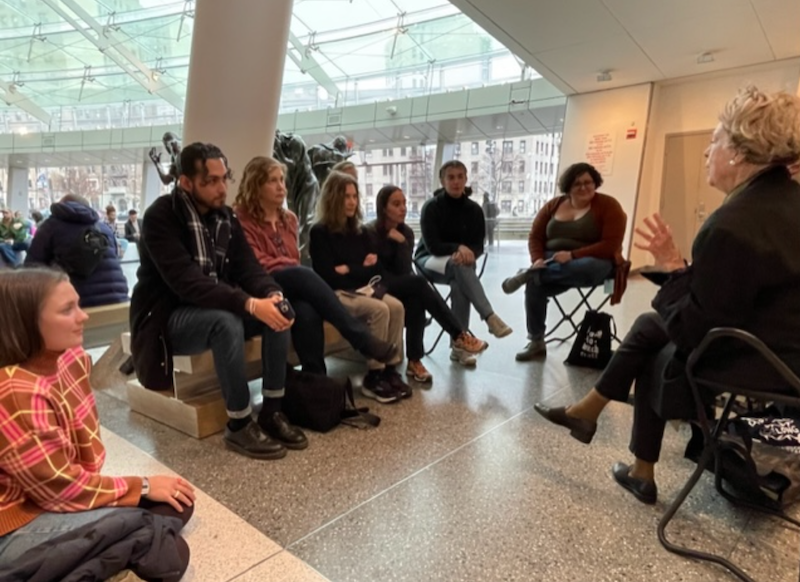
LEMCO students debrief with renowned art educator Rika Burnham (Frick Collection, Metropolitan Museum of Art) at the Brooklyn Museum after several class sessions involving long dialogues around a single work of art. This experience reinforced the notion of letting an art experience unfold gradually from the interests and observations that visitors make, rather than from the information we wish to impart. December 2022.
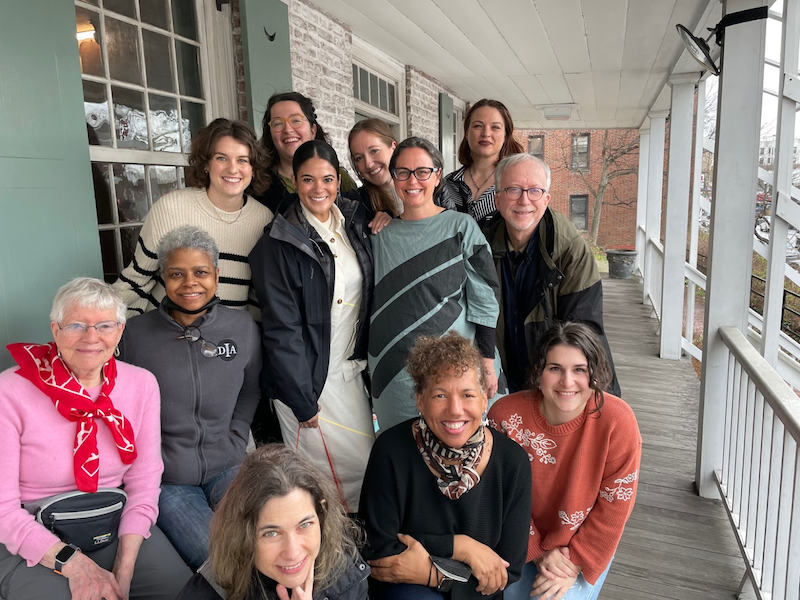
A student group and two former faculty members met with the interim director of the Dyckman Farmhouse in a bustling neighborhood in the Bronx, NY. Discussion centered on the opportunities and challenges of a small historical organization with a handful of staff. March 2023.
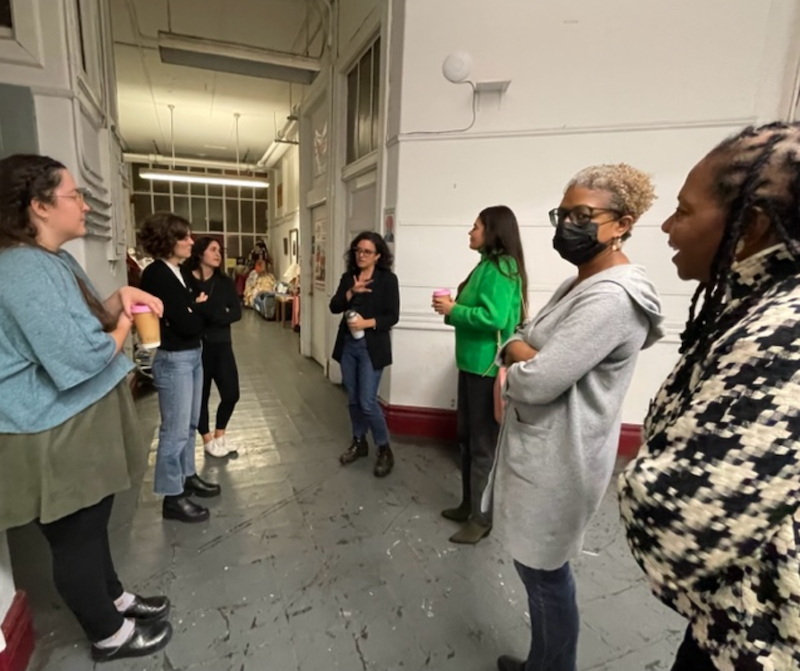
LEMCO students met with marketing and community engagement expert Donna Walker Kuhne (right) at La Clemente, a former public school space on Manhattan’s Lower East Side. This is a community-based organization housing visual artist studios, classrooms, and performance spaces catering to local groups and individuals. December 2022.
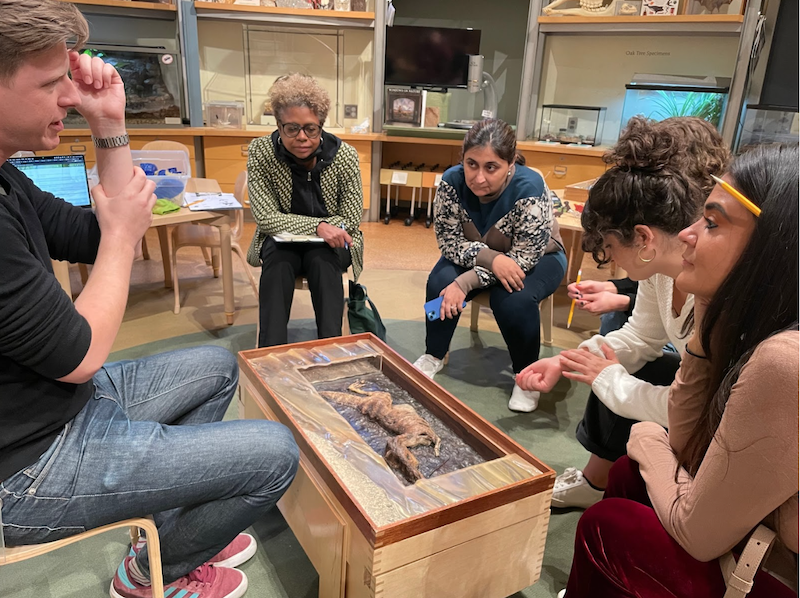
LEMCO students met with two instructors, Danny Zeiger and Naina Abowd, at the American Museum of Natural History’s Discovery Room in New York City. The field trip was part of a course on designing curriculum programs. December 2022.
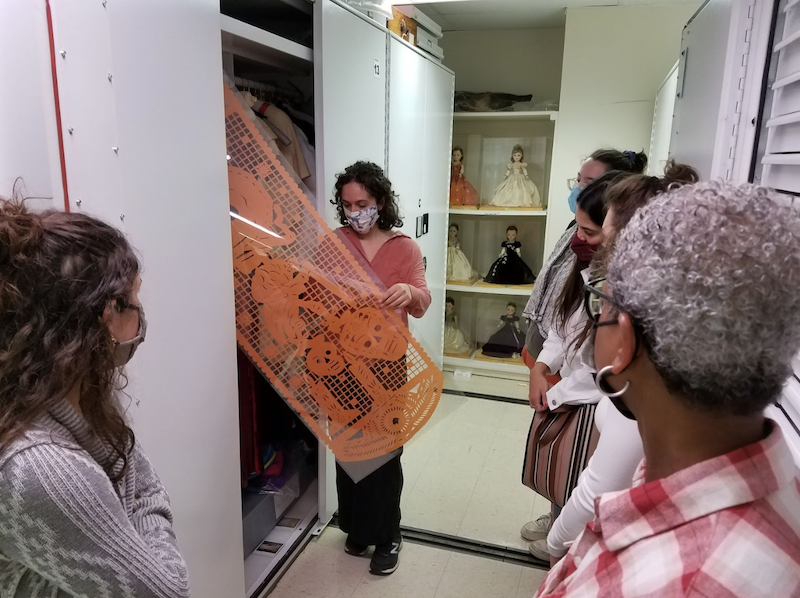
LEMCO students met with the head of collections at the Brooklyn Children’s Museum, the earliest children’s museum in the country. Many did not realize that some museums hold education collections that can enhance programming or be shared out in museum traveling kits. September 2021.
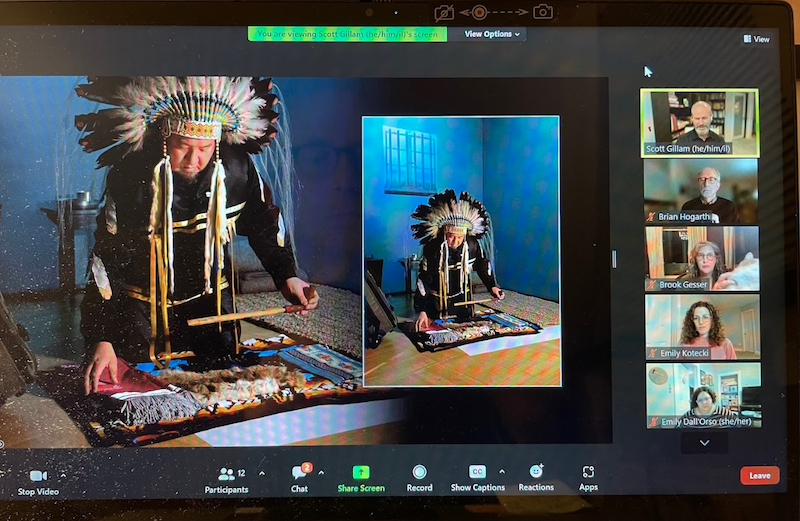
Online classes often feature guest speakers at a distance. Here, Scott Gillam of the International Human Rights Museum in Winnipeg, Manitoba talks with the group about accessibility programs with the help of various technologies at the museum. January 2023.
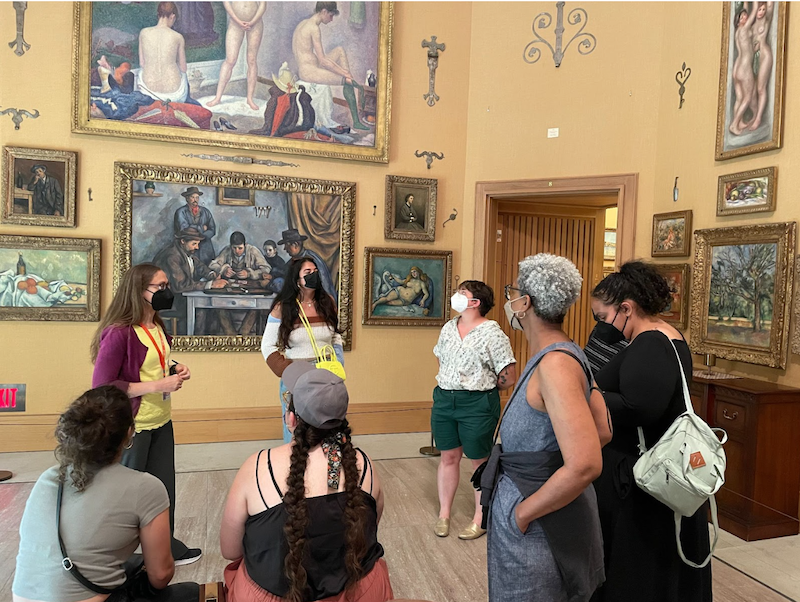
Many Bank Street alumni work at various museums on the East Coast and across the country. Here, LEMCO students met with Stephanie Stern (left), who oversees school programs at the Barnes Foundation in Philadelphia, PA. Discussion centered around examples of tours and gallery learning strategies. July 2022.
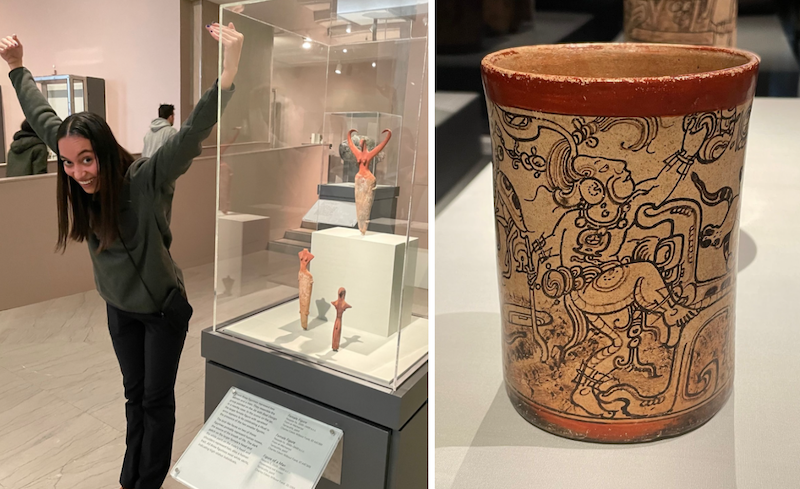
At the Brooklyn Museum (left) and the Metropolitan Museum of Art’s recent exhibition of Mayan art, close observation of objects led to interesting discussions around interpretation and even reimagining the provision of labels and other forms of information. 2023.
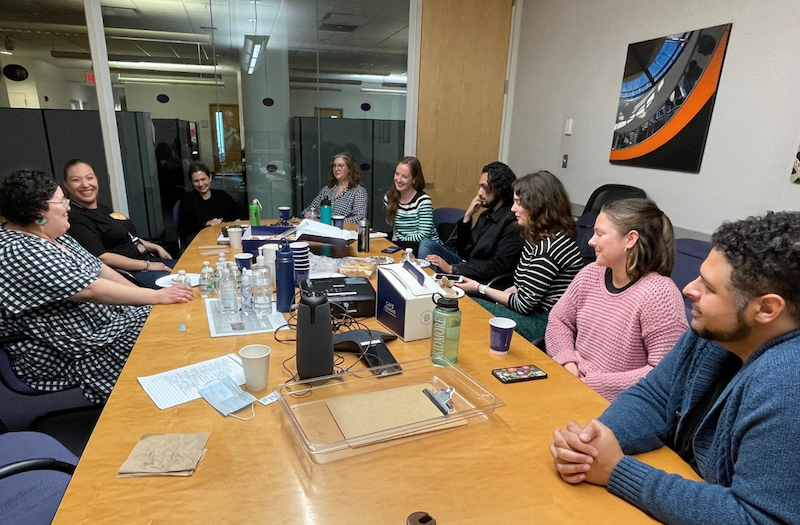
LEMCO students talked about community engagement strategies with Bank Street alumna Delia Meza, who manages family and community programs at the New York Hall of Science in Corona, Queens. April 2023.
Brian Hogarth, Director of Museum Education Programs at Bank Street Graduate School, is a native of Toronto, Canada. Brian worked in performing arts management before becoming manager of public programs at the Royal Ontario Museum and head of interpretation at the Glenbow in Calgary. In the US, he has been assistant director of education at the Indianapolis Museum of Art, director of education at the Nelson-Atkins Museum of Art, and for 10 years director of education at the Asian Art Museum in San Francisco. He has taught classes in art history and museum education at Johns Hopkins (Online) Museum Studies, Johnson Community College in Overland Park, and the University of Kansas in Lawrence. Brian holds an MA in East Asian Art History and a BA in Fine Arts/Theatre.
Learn more about our programs at Bank Street Graduate School of Education